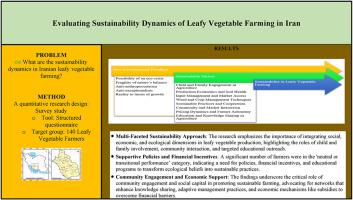评估伊朗叶菜种植的可持续性动态
IF 5.6
Q1 ENVIRONMENTAL SCIENCES
引用次数: 0
摘要
实现蔬菜种植的可持续性需要了解各种动态因素,这些因素对于形成有效的农业政策和实践至关重要。本研究通过对伊朗法尔斯省140名菜农的调查,评估了叶菜生产的可持续性,使用了一份经过严格验证的问卷,Cronbach's alpha系数为0.59-0.83。家庭劳动和代际农业参与、生产经济学、土壤健康、投入管理、市场准入、杂草和作物管理技术、可持续实践、社区互动、定价动态和教育等关键因素共同解释了可持续性差异的68.6%。整合新生态范式(NEP)框架显示,个人信念在农业成果中起着至关重要的作用,51.6%的农民在可持续性绩效中被归类为中性或过渡性,这表明意识与有效实践之间存在差距。重要的是,在不受欢迎的表现类别中,没有农民支持高的新经济政策值,突出了采用可持续做法的复杂性。本研究的见解和策略为政策制定者、农业推广服务和农民提供了宝贵的指导,有助于发展更可持续的农业系统。本文章由计算机程序翻译,如有差异,请以英文原文为准。

Evaluating sustainability dynamics of leafy vegetable farming in Iran
Achieving sustainability in vegetable cultivation involves understanding various dynamic factors essential for shaping effective agricultural policies and practices. This study assessed the sustainability of leafy vegetable production in Fars Province, Iran through a survey of 140 vegetable farmers using a rigorously validated questionnaire with a Cronbach's alpha coefficient of 0.59–0.83. Key factors such as family labor and intergenerational engagement in agriculture, production economics, soil health, input management, market access, weed and crop management techniques, sustainable practices, community interaction, pricing dynamics, and education collectively explained 68.6 % of the variance in sustainability. Integrating the New Ecological Paradigm (NEP) framework revealed that individual beliefs play a crucial role in agricultural outcomes, with 51.6 % of farmers categorized as neutral or transitional in sustainability performance, indicating a gap between awareness and effective practices. Importantly, no farmers in the Undesirable performance category endorsed high NEP values, highlighting the complexities of adopting sustainable practices. Insights and strategies from this research offer valuable guidance for policymakers, agricultural extension services, and farmers, contributing to the development of more sustainable agricultural systems.
求助全文
通过发布文献求助,成功后即可免费获取论文全文。
去求助
来源期刊

Environmental and Sustainability Indicators
Environmental Science-Environmental Science (miscellaneous)
CiteScore
7.80
自引率
2.30%
发文量
49
审稿时长
57 days
 求助内容:
求助内容: 应助结果提醒方式:
应助结果提醒方式:


